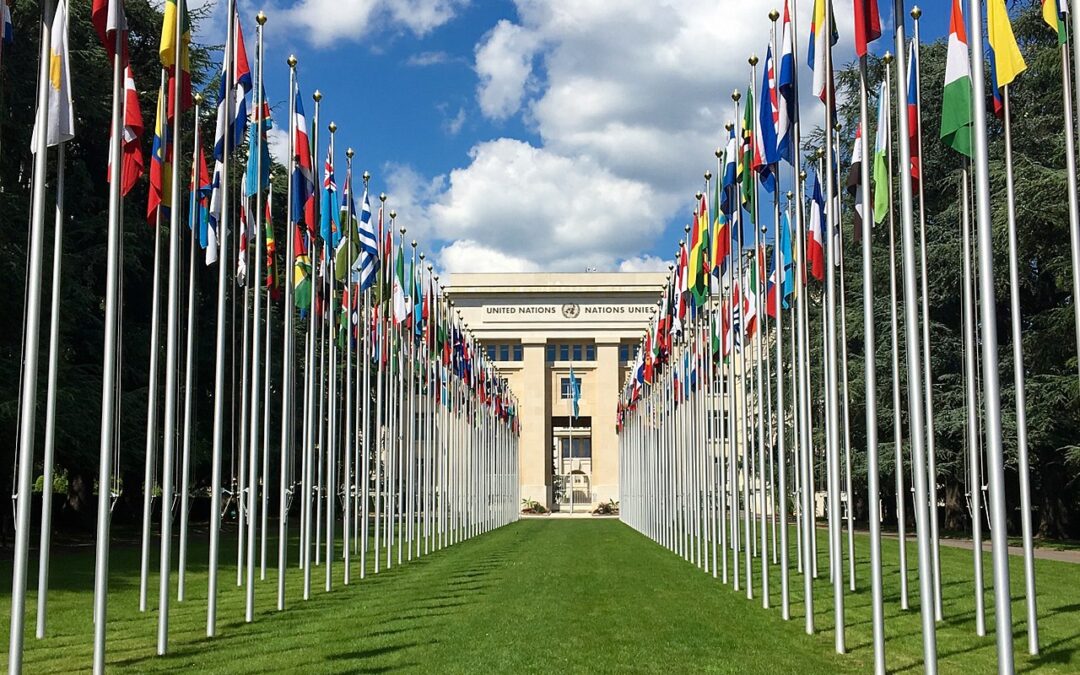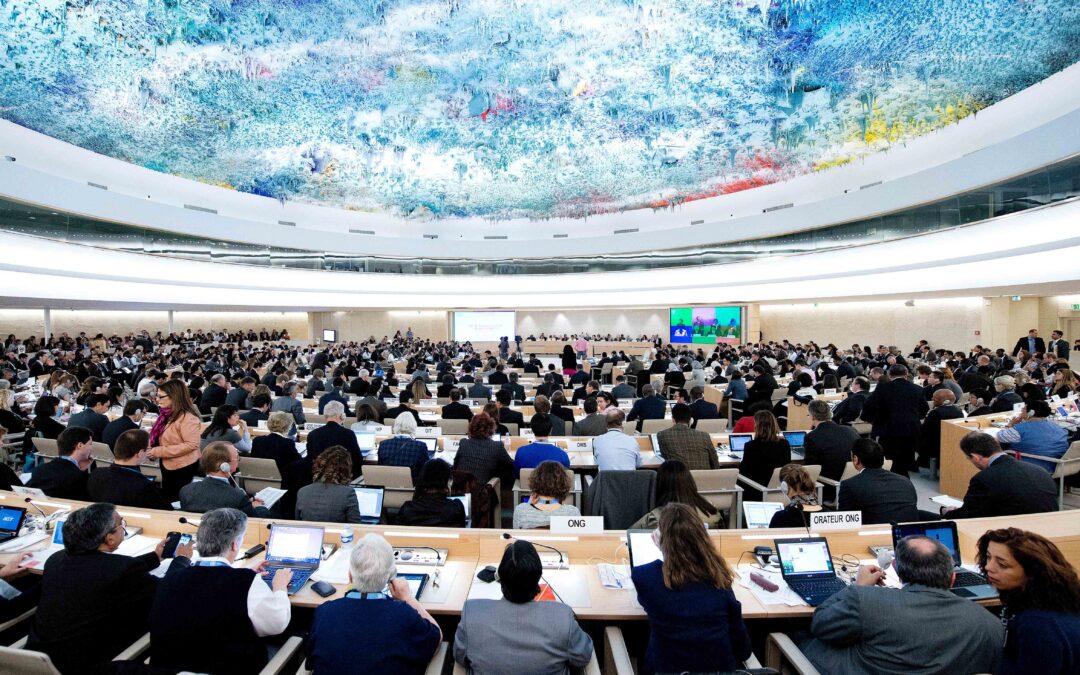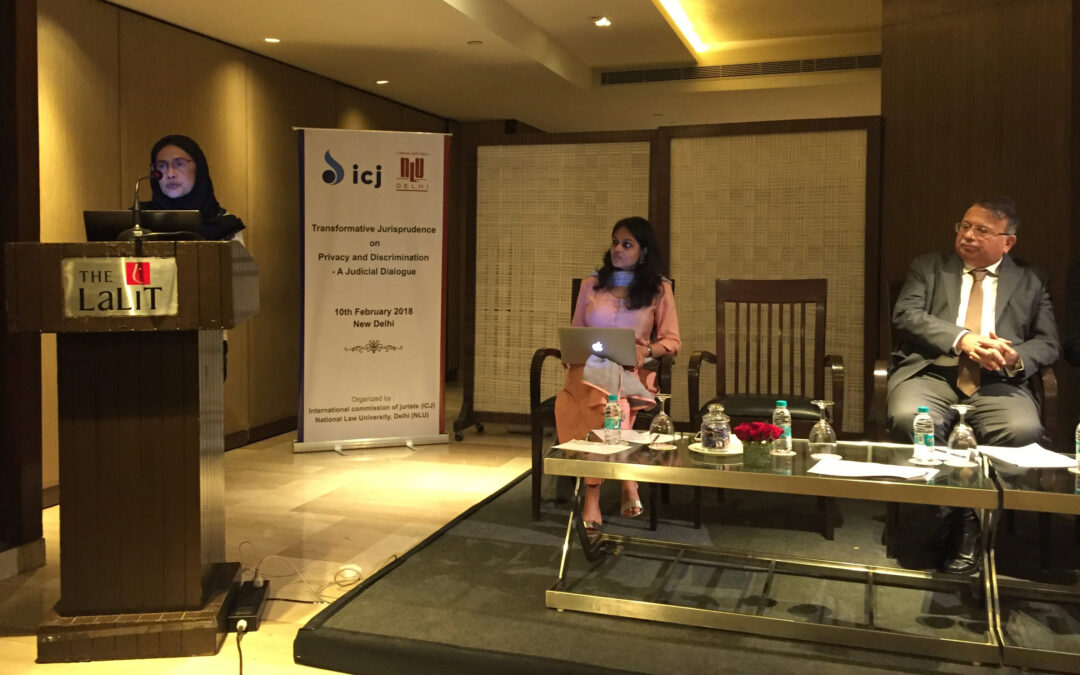
Jul 28, 2020 | Advocacy, Cases, Legal submissions, News
The ICJ intervened today in the case of the potential surveillance by Polish secret services of Mikołaj Pietrzak, lawyer and chair of the Warsaw Bar Association, Dominika Bychawska-Siniarska et Barbara Grabowska-Moroz of the Helsinki Foundation of Human Rights, and Wojciech Klicki and Katarzyna Szymielewicz of the foundation Panoptykon.
The five applicants applied to the European Court of Human Rights claiming a violation of their rights to privacy and to an effective remedy because the system of secret surveillance and collection of metadata created by the Law amending the Law of the Police of 15 January 2016 and the Anti-Terrorism Law of 16 June 2016 does not provide sufficient guarantees for this rights’ protection.
In its third party intervention, the ICJ addressed (1) the application of the principles of prescription by law, necessity and proportionality, in circumstances when mass and targeted surveillance interferes with the right to respect for private life under Article 8 ECHR, in particular when it affects lawyers and human rights defenders; (2) the obligations of States under Article 8 and 6 ECHR to ensure respect for the confidentiality of lawyer-client relations and the principle of legal professional privilege.
The ICJ argued that secret surveillance, in particular where it interferes with the confidentiality of communications of lawyers and human rights defenders, and endangers lawyer-client privilege protected under Articles 8 and 6 ECHR, should be subject to specific safeguards and to particularly strict scrutiny of its necessity and proportionality.
The third party intervention can be found here: PIetrzak&HF_v_Poland-AmicusCuriae-ECtHR-Cases-2020-ENG

Sep 27, 2019 | Advocacy, Non-legal submissions
Today, at the close of the 42nd regular session of the UN Human Rights Council in Geneva, the ICJ and other NGOs highlighted key acheivements and failures.
The joint civil society statement, delivered by International Service for Human Rights (ISHR) on behalf of the group, read as follows (not all text could be read aloud due to time limits):
“The Council reaffirmed that reprisals can never be justified. Council members rejected attempts to weaken the text including attempts to delete the references to the roles of the Assistant Secretary-General and the Human Rights Council Presidents. The resolution listed key trends such as the patterns of reprisals, increasing self-censorship, the use of national security arguments and counter-terrorism strategies by States as justification for blocking access to the UN, acknowledged the specific risks to individuals in vulnerable situations or belonging to marginalized groups, and called on the UN to implement gender-responsive policies to end reprisals. The Council called on States to combat impunity and to report back to it on how they are preventing reprisals, both online and offline. The Bahamas and the Maldives responded to this call during the interactive dialogue and we encourage more States to follow their good practice. We also encourage States to follow the good practice of Germany and Costa Rica in raising specific cases of reprisals. The Council also welcomed the role of the Assistant Secretary-General and invited the General Assembly to step up its efforts to address reprisals and ensure a coherent system-wide response.
We welcome the creation of a Fact-Finding Mission (FFM) on Venezuela as an important step towards accountability for the grave human rights violations documented by the High Commissioner. We urge Venezuela to cooperate with the FFM and to honor the commitments they have made during this session, including by allowing OHCHR unfettered access to all regions and detention centers and implementing their recommendations. Cooperation and constructive engagement and measures for international accountability and justice should be seen as complementary and mutually reinforcing.
We welcome the renewal and strengthening of the mandate of the Group of Eminent Experts on Yemen, sending a clear message to parties to the conflict – and to victims – that accountability is at the center of the mandate, and providing a crucial and much-needed deterrent to further violations and abuses. States should support the recommendations made by the GEE in their recent report, including prohibiting the authorization of transfers of, and refraining from providing, arms that could be used in the conflict to such parties; and clarifying the GEE’s role to collect and preserve evidence of abuses.
We welcome the renewal of the mandate of the Special Rapporteur on Cambodia, but regret that calls to strengthen the mandate of the OHCHR to monitor and report on the situation have been ignored. We regret that the resolution fails to accurately depict the continuing crackdowns on civil society and the severity and scale of recent attacks on the political opposition.
We welcome the renewal of the mandate of the Commission of Inquiry on Burundi. Its work is vital as the country heads towards elections in 2020. The Burundian Government should desist from denial and insults, and should cooperate with the Commission and other UN bodies and mechanisms.
We welcome that the EU and OIC have jointly presented a resolution on Myanmar requesting the High Commissioner to report on the implementation of the recommendations of the Fact-Finding Mission at HRC 45. However, the international community needs to take stronger action to ensure accountability for and cessation of grave international crimes, in particular by referring Myanmar to the ICC and imposing a global arms embargo – and by acting on the FFM’s reports, including those on economic interests of the military and on sexual and gender-based violence in Myanmar and the gendered impact of its ethnic conflicts.
The joint EU/OIC resolution on Myanmar welcomes the FFM report on the military’s economic interests, which identifies companies contributing to abuses. The High Commissioner, however, has still not transmitted the database of companies facilitating Israel’s illegal settlements more than 2 and a half years after its mandated release. The High Commissioner pledged in March to fulfil the mandate “within the coming months”. The ongoing unexplained and unprecedented delays have become a matter of credibility, for both the High Commissioner and the HRC. Mr. President, we request that you confer with the High Commissioner and advise as soon as possible when this important Council mandate will be fulfilled.
‘Cautious optimism’ best defines our approach to Sudan. While this year’s resolution, which welcomes the peaceful popular uprising, renews the Independent Expert’s mandate, supports the opening of an OHCHR country office, and highlights the role and needs of civil society, is an improvement on 2018, significant challenges remain. Ensuring accountability for the perpetrators of grave human rights and humanitarian law violations should be a central priority for the new Government, and the Council should assist in this regard.
We regret the lack of Council action on Kashmir and urge the Council, as well as India and Pakistan, to act on all the recommendations in the report of the UN High Commissioner for Human Rights.
On terrorism and human rights, we are deeply disappointed that Mexico and other States have partially acquiesced in attempts by Egypt to dilute or distract the work of the Special Rapporteur on counter-terrorism away from its appropriate focus on human rights violations while countering terrorism and human rights of victims of terrorism. We regret that States have asked the Special Rapporteur to spend the limited time and resources of the mandate, to comment on the overbroad concept of the “effects” of terrorism, by which Egypt and some other States seem primarily to mean macroeconomic, industrial, and investment impacts, rather than the human rights of individual victims. The length to which States seem willing to put the existing Special Rapporteur’s mandate at risk, in the name of protecting it, while failing even to incorporate stronger consensus text on human rights issues included in the most recent merged parallel resolution at the General Assembly, suggests that the merger of the previous Mexican and Egyptian thematic resolutions no longer holds any real promise of positive results for human rights.
We welcome the adoption of the resolution on the question of the death penalty, which is an important reflection of the movement towards the international abolition of this cruel punishment. Significantly, this resolution reiterates and affirms the position of international law that the abolition of the death penalty is an irrevocable commitment and that an absolute prohibition exists to guard against its reintroduction. We also welcome the acknowledgement of the ‘most serious crimes’ threshold that acts to restrict the death penalty, in States that have yet to abolish it, only to crimes of extreme gravity; this resolution plainly identifies that criminal conduct that does not result directly and intentionally in death can never meet the threshold test and can never serve as a basis for the use of the death penalty. We are very pleased to acknowledge that the adoption of this resolution is complimentary to the General Assembly’s resolution calling for an international moratorium on the death penalty and, together, they serve to illustrate the advancing global commitment to abolition.
We welcome the Council’s renewed attention to the protection of the right to privacy in the digital age: fully integrating human rights into the design, development and deployment of Artificial Intelligence, machine learning technologies, automated decision-making, and biometric systems, is essential to safeguard not only the right to privacy, but also to freedom of expression, peaceful assembly, and association, and economic social and cultural rights.
On human rights in the administration of justice, we welcome the focus in this year’s resolution on concrete measures to prevent and respond to violence, death and serious injury in situations of deprivation of liberty, which illustrates the potential of thematic resolutions to set out specific practical, legal and policy steps that can be drawn on by governments, civil society, and other stakeholders to have real positive impact at the national level.
We commend Australia for its leadership on Saudi Arabia, as well as the other States who stood up for women’s rights activists and accountability. We urge more States to live up to their commitment to defend civil society and sign the statement in the coming 2 weeks.
We appreciate the attention paid by individual governments to the situation in China, including the dire situation facing Uyghurs and other Turkic Muslims; the crackdown on human rights defenders, including those working to draw attention to violations of economic, social and cultural rights; and the suppression of fundamental freedoms in Tibet. However, we deplore that the Council and many of its members have once again failed to take decisive action to ensure monitoring and reporting on the human rights situation in the country, especially Xinjiang, and press for access for the High Commissioner.
For five years since the last joint statement in March 2014, the Council has failed to hold Egypt accountable for continuing systematic and widespread gross human rights violations. In the latest crackdown on peaceful protests, reports indicate that more than 2000 people have been arrested in the past week. When will the Council break its silence and convene a Special Session to address the grave and deteriorating human rights situation in Egypt?”
Signatories:
- International Service for Human Rights (ISHR)
- DefendDefenders (the East and Horn of Africa Human Rights Defenders Project)
- Commonwealth Human Rights Initiative (CHRI)
- CIVICUS: World Alliance for Citizen Participation
- Cairo Institute for Human Rights Studies
- Asian Legal Resource Centre
- Asian Forum for Human Rights and Development (FORUM-ASIA)
- International Commission of Jurists (ICJ)
- Amnesty International
- Association for Progressive Communications (APC)
- Human Rights Watch
- International Federation for Human Rights (FIDH)

Jun 20, 2018 | Advocacy, Non-legal submissions
At the UN the ICJ today addressed abuse of laws in Southeast Asia to restrict freedom of expression.The statement was made in an interactive dialogue with the UN Special Rapporteur on Freedom of Expression, at the UN Human Rights Council in Geneva. It read as follows:
“The ICJ welcomes the report of the Special Rapporteur on Freedom of Expression (A/HRC/38/35), on online expression. Such concerns are reflected in the continued weaponization of laws to criminalize and unduly restrict freedom of expression in Southeast Asia. Increasingly, laws are misused to harass and intimidate civil society, journalists, politicians and ordinary individuals.
For example, in Cambodia, three persons were arrested – two charged and detained in May, and one reportedly arrested this past weekend – for sharing content on Facebook in alleged violation of a recent lèse majesté law. Another man was similarly detained, and a woman extradited from Thailand to Cambodia and imprisoned, for Facebook posts deemed critical of the government. An inter-ministerial order signed last month now allows government agencies to monitor and censor information on websites and social media.
Another example is Vietnam, where as well-known bloggers remain in jail, last week lawmakers adopted a cybersecurity law that will compel companies to store users’ data in-country, pass personal data to government authorities, and censor information online when directed to do so by the government.
A further example is Thailand, where this year alone at least 132 people were charged for “illegal assembly” after protesting for elections to be held – 27 were also charged with a sedition-like offence carrying a maximum penalty of seven years’ imprisonment. Last week, arrest warrants were reportedly issued alleging dissemination of false information on Facebook, which may lead to charges under the Computer Crimes Act carrying a maximum penalty of five years’ imprisonment, despite international standards precluding imprisonment as an appropriate penalty.
The ICJ urges all States to implement the recommendations in the report of the Special Rapporteur, and to ensure the right to freedom of expression by revoking or amending all laws, orders, policies or other actions which unjustifiably restrict this fundamental freedom.”

Feb 11, 2018 | News
On 10 February 2018, the ICJ, in partnership with the National Law University, Delhi (NLU), organized a judicial dialogue on transformative jurisprudence on privacy and discrimination.
Participants included judges from the Supreme Court of India, the High Court of Delhi, and the District Courts of Delhi; ICJ Commissioners: Justice Ajit Prakash Shah, from India, who made the event possible through his support, Justice Kalyan Shrestha, from Nepal, Justice Adolfo Azcuna, from the Philippines; a Commissioner of Thailand’s National Human Rights Commission; and lawyers and activists from India. The judicial dialogue examined the relationship between the right to privacy, the principle of non-discrimination, and the right to equality before the law, in the context of one’s sexual orientation and/or gender identity, as well as in light of the jurisprudence of the Indian Courts.
It pursued the ICJ’s larger goal of addressing the need for sustained, ongoing engagement with the Indian judiciary on LGBTI rights, to facilitate better access to justice for the LGBTI community, with the help of a sensitized judiciary.
The discussions lent support to domestic advocacy efforts directed at other State and non-State actors to get them to better address and reduce discriminatory treatment and homophobic and transphobic attitudes towards LGBTI communities by challenging discriminatory laws and practices.
The dialogue underscored the different facets of the dynamic right of privacy in relation to the human rights of disenfranchised communities, and discussed sexual orientation and gender identity as essential attributes of one’s identity deserving of and entitled to protection.
The conversation touched upon emergent challenges in the privacy debate, in light of technological advances, critiquing the Indian Government’s unique identification project whereby the Government’s programme of issuing a 12-digit unique identity number to all Indian residents based on their biometric and demographic data, and which will be needed to access government and private sector services, is currently being contested in the Supreme Court on account of privacy concerns.
The speakers emphasized the importance of the right to be forgotten and the right to limit one’s audience as essential to a right to privacy, given the increasing importance of the internet.
The speakers also highlighted the need for the judiciary to uphold fundamental rights enumerated in the constitution instead of pandering to populist beliefs and mores
There was unanimous agreement among the judges and the extended legal community that Section 377, Indian Penal Code, which criminalizes “voluntary carnal intercourse against the order of nature” needs to be struck down, to facilitate progress in developing a rights framework for sexual minorities.
There was criticism of other discriminatory laws, including draft legislation, such as the current Indian Transgender Persons (Protection of Rights) Bill, 2016 for its denial of an individual’s right to self-identify one’s gender.
The speakers reiterated the need for a comprehensive effort from the Indian judiciary, and other State actors with a focus on judicial training and sensitization, as well as police reform, to ensure that India is able to fulfill its international and constitutional obligations to respect, protect, and fulfill the rights of the LGBTI community.
A common theme was the importance of comparative and international law in the development of Indian jurisprudence.
The speakers discussed the ‘Yogyakarta Principles on the Application of International Law in Relation to Issues of Sexual Orientation and Gender Identity’ at length, and the growing prominence of these Principles in Indian jurisprudence, as reflected in the Puttuswamy and National Legal Services Authority v. Union of India judgments, both of which quoted the Yogyakarta Principles extensively.
The dialogue focused on the role of the judiciary, the need for sensitization regarding the human rights violations of the LGBTI community among the judiciary in India and South and South East Asia and, in that context, the importance of judicial dialogues.
ICJ Commissioner Justice Shrestha emphasized that South Asian judges have typically played a more important role than the legislature in advancing human rights.
He discussed the importance of judicial creativity in providing remedies, and emphasized that training programs must include best practices and that judicial training programs must be imparted regularly.
The dialogue stressed the importance of judicial trainings highlighting the role that Justice Cameron and Justice Kirby, both former ICJ Commissioners, have played in raising awareness about the relationship between human rights and issues of sexuality, HIV/AIDS and gender identity in India.
It reiterated the importance of judges being in touch with people’s lived realities, and thus the importance of encouraging judiciary’s interaction with the LGBTI community.
For more information: maitreyi.gupta(a)icj.org

Jan 25, 2018 | News
Myanmar’s publication in state media of lists with the names and accompanying photographs of more than 1,400 men, women and children under the heading “Members of ARSA Terrorist Group” constitutes an assault on human rights and contravenes key principles of the rule of law.
Authorities have not explained why or how listed persons were identified, if they are currently in detention, or if they are wanted for prosecution or for questioning pursuant to criminal investigations. Some or all persons listed appear to have been “accused” outside any formal judicial process.
Given the lack of publicly available information as to the basis of ascribing membership of a prescribed terrorist organization to the persons in the photos, and the manner in which their information has been publicized, the ICJ is concerned that the stated accusations may be arbitrary.
To the extent that there may be any credible basis for ascribing criminal conduct, the authorities have an obligation to administer justice through due process and fair trials, and not name calling and public shaming.
Authorities should cease publishing such material and take effective protective measures to ensure the safety and security of the people named in these publications and their families.
Serious crimes, including alleged acts of terrorism as well as human rights violations, necessitate investigations that are prompt, independent, impartial, effective and transparent in line with international standards.
As with other crimes, the investigation and prosecution of alleged acts of terrorism should conform to applicable national laws, including Myanmar’s Code of Criminal Procedure, to the extent these do not violate applicable international standards.
If any of the listed individuals have been detained, they must be brought promptly before a judge and charged with a cognizable offense or else released.
Accused persons must be afforded legal protections, and if properly charged, they must be brought to justice through fair trials.
State authorities have a duty to respect and ensure the presumption of innocence.
Authorities must refrain from making public statements that are defamatory in nature, that violate fair trial rights by affirming or implying the guilt of persons accused of crimes, and that violate the principle of judicial independence and the separation of powers, all of which are recognized in national and international law.
Particularly given the heightened tensions prevailing in northern Rakhine State, persons included in these lists and their families are at great risk of extra-judicial reprisals, which violates their right to security of the person.
In addition, the potentially defamatory publication of these photos by the government constitutes a violation of their right to privacy.
It also seriously undermines the government’s stated commitments to facilitating the safe return of refugees, and its responsibility to safeguard the physical security and integrity of all individuals from all communities in Myanmar.
Background
From 17 to 23 January 2018, Myanmar authorities published lists with the names, photos and identifying information of more than 1,400 men, women and children who they summarily accuse in the publications of involvement in or association with terrorism-related acts in Rakhine State.
These lists contain photos accompanied by captions with information variously including the name, age, village, alleged transgression, and other identifying information.
Most individuals are identified as “the terrorist” while others are characterized as a “family member of terrorists” or having “sympathized with the terrorist groups.”
The lists have run as supplements in the daily Burmese-language Myanmar Alinn newspaper and in the daily English-language Global New Light of Myanmar newspaper, published by the Ministry of Information.
Extracts have been published by the Office of the President of the Union, and by the Ministry of Foreign Affairs, which on 16 January requested Bangladesh authorities to extradite “accused” persons to Myanmar.
The ICJ has previously expressed concern that during and following security operations in Rakhine State, authorities have systematically failed to respect the rights of detainees in accordance with national and international law and standards.
Authorities have also so far failed to hold to account members of security forces, including soldiers and police, who appear to have perpetrated crimes against both Rohingya and Rakhine inhabitants of Rakhine State.
More than 650,000 inhabitants of northern Rakhine State, the vast majority of whom are Rohingya Muslims, have been displaced as a result of security operations commanded by Myanmar’s military, the Tatmadaw, following attacks on police posts by the Arakan Rohingya Salvation Army (ARSA) on 25 August 2017.
The government’s Counter-Terrorism Central Committee has declared ARSA as a ‘terrorist organization’ and stated that its supporters would be held responsible for acts of terrorism, pursuant to the 2014 Counter-Terrorism Law.
Myanmar-Terrorist Lists-News-web story-2018-BUR (story in Burmese, PDF)









